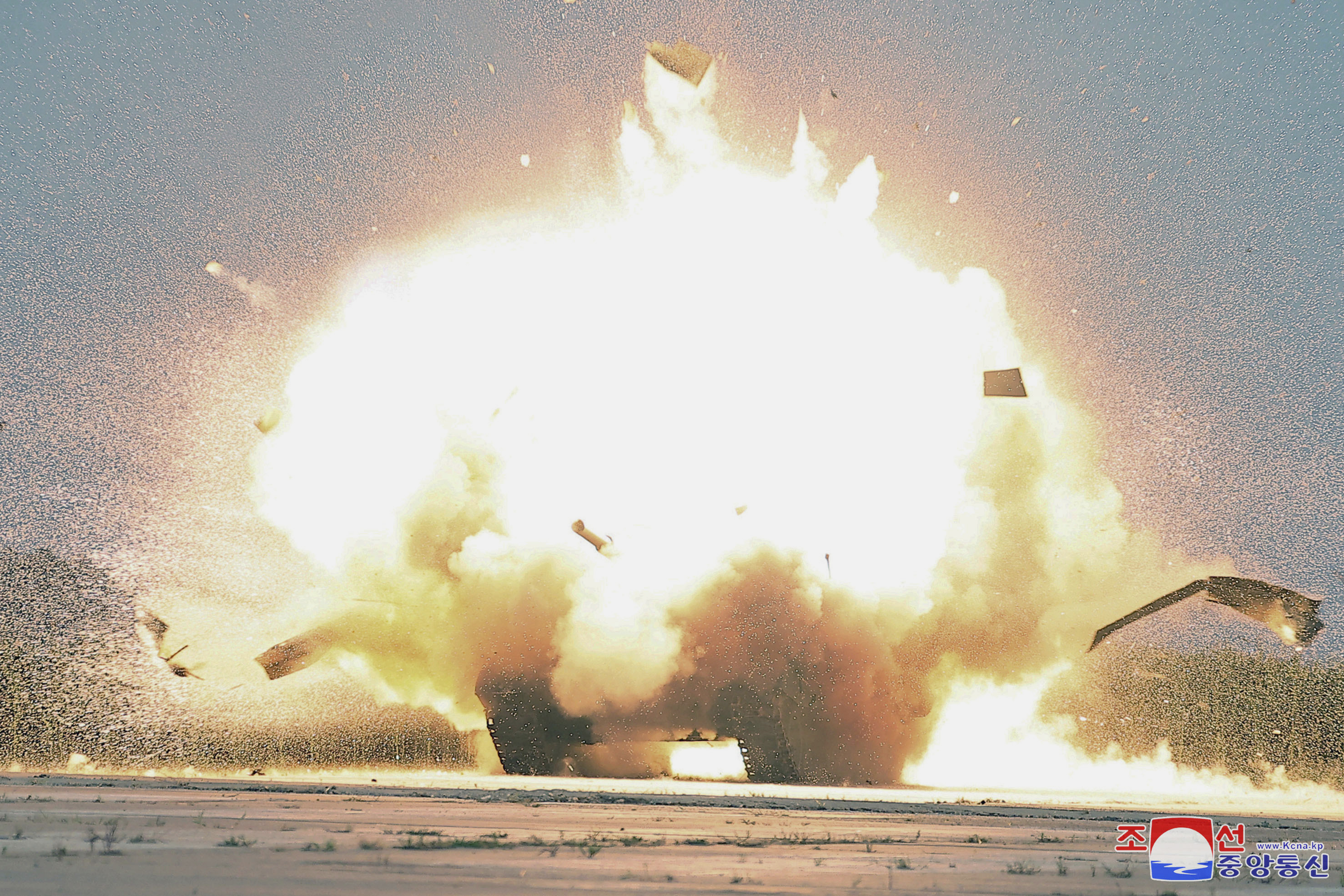North Korean leader Kim Jong Un supervised a demonstration of new exploding drones designed to crash into targets, state media said Monday, as the U.S. and South Korea engage in joint military drills.
North Korean test photos showed a white drone with X-shaped tails and wings supposedly crashing into and destroying a target resembling South Korea's main K-2 battle tank. Most combat drones stand off from targets and fire missiles.
The North's official Korean Central News Agency said Saturday's test involved various types of drones built to fly different ranges to attack enemy targets on land and sea and flew along various routes before accurately hitting test targets. After the test, Kim pledged to spur the development of drones that explode on impact, conduct reconnaissance or attack targets underwater to boost his country's war readiness, saying the North's military should be equipped with advanced drones "as early as possible," KCNA said.
The drone test came as the U.S. and South Korean militaries conduct the large-scale Ulchi Freedom Shield drills, which continue through Thursday. The exercises focus on enhancing their readiness against North Korean threats and include computer-simulated war games and live-fire training, with a combined aerial drill involving 60 warplanes that began its three-day run on Monday.
South Korea's air force said the drill, which kicked off with precision-bombing demonstrations that included South Korean F-35 and F-16 fighter jets, is aimed at coping with North Korean threats posed by drones, cruise missiles and artillery.
The United States and South Korea also began Monday a separate amphibious landing drill involving dozens of aircraft and vessels from their navies and marines, including U.S. F-35 fighters and amphibious assault ship USS Boxer. South Korea's military said the Ssangyong Exercise, which will continue through Sept. 7, is aimed at sharpening combat interoperability.
Lee Chang Hyun, spokesperson of South Korea's Joint Chiefs of Staff, said during a briefing that South Korea's military was closely examining North Korea's drone capabilities and that the South's military is equipped with systems to detect and intercept them, without providing further details.
Some analysts suggest the North Korean drones shown in state media photos resemble Russia's Zala Lancet-3 drones, and Lee said the South was looking into the possibility Russia had helped North Korea acquire its drone capability.
"We are aware that during the past exchanges between North Korea and Russia that some (drones) were given (to North Korea) as gifts," Lee said. "We would need to analyze various aspects, including whether (North Korea) would have modified to improve their capabilities or other possibilities."
North Korea and Russia have been aligning closely in the face of their separate confrontations with the U.S. Kim Jong Un and Russian President Vladimir Putin held summits this June and in September last year.
Washington and its allies have accused the countries of expanding an alleged arms arrangement in which North Korea provides Putin with badly needed munitions to prolong Russia's fighting in Ukraine in exchange for economic aid and technologies to upgrade Kim's nuclear-armed military.
Animosity on the Korean Peninsula is high as Kim uses Russia's war against Ukraine as a distraction while he strengthens his nuclear-armed military and issues verbal threats of conflict toward Washington and Seoul. While most of the international attention has been focused on his long-range missiles designed to reach the U.S. mainland, Kim has also been expanding weapons targeting rival South Korea, most notably short-range missiles and artillery systems the North has described as nuclear-capable.
Earlier this month, Kim staged a huge ceremony in the capital, Pyongyang, to mark the delivery of 250 nuclear-capable missile launchers to frontline military units and called for a ceaseless expansion of the military's nuclear program. This added to concerns as he demonstrated an intent to deploy battlefield nuclear weapons along the North's border with South Korea and claimed his military could react with preemptive nuclear strikes if it perceived the leadership was under threat.
In a closed-door briefing to lawmakers on Monday, South Korea's spy agency said it's unclear whether North Korea is currently capable of producing enough missiles to fill up those launch vehicles, which are each designed to fire multiple missiles with potential range to cover most of South Korea's greater capital area and central regions.
The agency said the North has been focusing its manufacturing capacities on producing missiles and other military equipment that are being supplied to Russia, according to the office of lawmaker Park Sun-won, who attended the briefing.
Analysts say Kim may seek to dial up pressure in a U.S. election year as he advances his long-term goals of forcing Washington to accept the idea of the North as a nuclear power and negotiate economic and security concessions from a position of strength.
